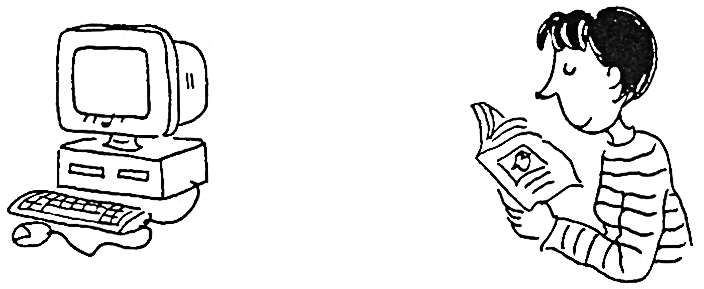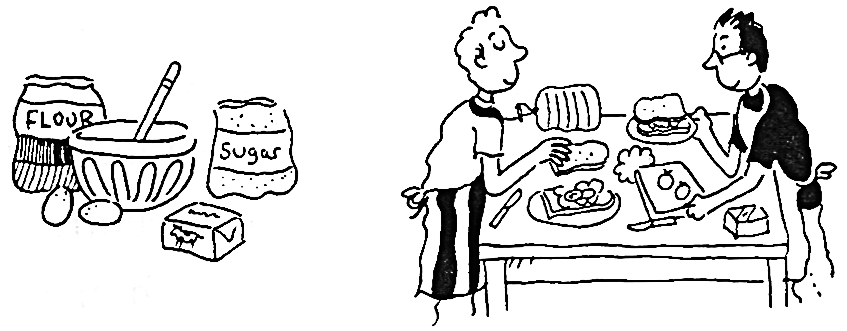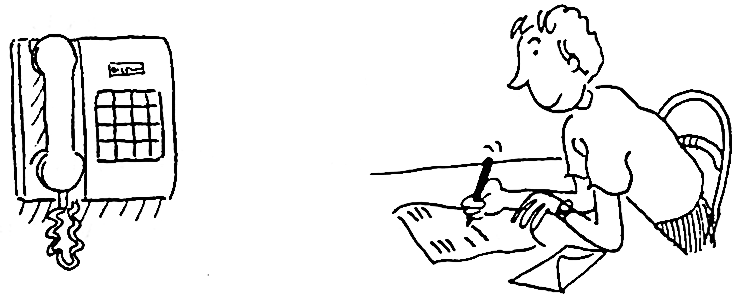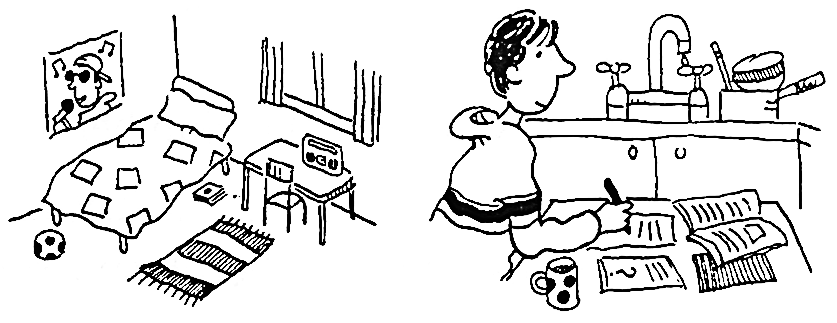
- •English for marine engineering cadets (Английский для курсантов-судомехаников)
- •Введение
- •Оглавление
- •Unit 1.Visiting a port (giving directions)
- •Lesson 1
- •Mariposa
- •Lesson 2
- •Lesson 3
- •Read the phrases below. They show that you understand or agree. Find the words and phrases in the dialogue in Ex 6 and reproduce the situations where these phrases are used.
- •Listen to the recording. Repeat the phrases.
- •Look at the map of the area of New Dale. Look for : a hotel, a hospital, a river, a hill town, the beach, two bridges, four villages.
- •Read the tourist information about the area of New Dale. Write the names of the towns and villages on the key on the map.
- •Practise the dialogue with your study partner. Ask for information and directions to other places in New Dale. Unit 2. Seasons and weather
- •Lesson 1
- •Безличные предложения
- •Read the sentences and say which of them are suitable for today’s weather.
- •Complete the sentences with a correct form of the verb to be.
- •Use it or there with a correct form of the verb to be.
- •True or false? If a sentence is false, give a true sentence about the weather conditions in the sentence.
- •5. What types of weather are bad and good for doing these things?
- •6. What kinds of weather do you think causes the following to happen? Make up some sentences which could go before each of these ones.
- •7. There are three ways of talking about the weather.
- •Read and translate the following sentences paying attention to the degrees of comparison.
- •Form the comparative and the superlative of three- or more syllable adjectives and of some two-syllable adjectives using more / (the) most.
- •Answer the following questions:
- •Read and translate the following phrases.
- •Complete the text about the weather in Britain, using the words and expressions in the box. The Weather in Britain
- •This chart shows anyone who wants to visit the West of Ireland what weather to expect at different times of the year. Make a similar chart for the Murmansk region.
- •Listen to the recording. What do Cheryl and Marcus say about the weather in South Africa and the north of England? When is the best time to go? lesson 3
- •Read the text “Winter in Murmansk” Winter in Murmansk
- •Answer the questions on the text.
- •If you like winter in Murmansk what arguments you can give in favour of it. If you don’t like winter, give your reasons. Discuss it with your study partner.
- •Describe summer in Murmansk.
- •Read the dialogue and tell what Nick’s favourite season is and why Peter doesn’t like summer. Tastes differ
- •Discuss with your study partner your likes and dislikes concerning seasons and weather.
- •In groups. Express your opinions and participate in the discussion while answering the following questions.
- •Read the sentences and translate them into Russian.
- •Make up Participle I adding –ing to the given verbs.
- •Настоящее длительное время (The Present Continuous Tense)
- •3. Match the phrases with the pictures.
- •Complete the sentences using Present Continuous.
- •5. Choose the correct verb tense.
- •6. Answer the questions. Use the Present Continuous or the Present Simple.
- •7. Complete the dialogues by choosing a phrase from the box and putting the verb in brackets into the Present Continuous.
- •Lesson 2
- •Unit 4. Emergency! lesson 1
- •Match the words with the pictures. Remember the emergency situations.
- •Look at the verbs. Complete the sentences. Choose a verb for each command.
- •Listen to the recording. Repeat the commands.
- •Read the commands. Choose the commands that are suitable in the following situations. Look at pictures of emergency situations (Ex. 1).
- •Lesson 2
- •Look at the pictures. They show an enclosed space rescue. What must you do? Talk about each picture.
- •Read the text from a safety manual. Check your answers from Exercise 1.
- •Read the text. Complete the sentences with one of the verbs from the box.
- •Fire onboard!
- •Answer the questions on the text.
- •Read the dialogue. What a.B.’s actions are incorrect?
- •Who is responsible for doing the definite actions if the man falls overboard?
- •Read the text and check if you are right with your answers. Man overboard!
- •Read the text. What can such emergencies as grounding and collision cause? Why are they so dangerous?
- •Глагол to be
- •Make up different questions to each sentence of the text.
- •Look at the map. It shows the area of operation of the mv Karrier on a voyage last year. Answer the questions about the mv Karrier’s route. Memorize the new words used in the questions.
- •Pair work. Explain to your study partner the purpose of the mv Karrier’s arriving to different ports.
- •Describe the voyage which the mv Karrier made last year. Lesson 2
- •Match the infinitive forms and the Past Simple forms of the irregular verbs. Learn these forms by heart. Use a dictionary to check the meaning of each verb.
- •Listen to the cd. Three seafarers are describing their voyages. Copy the chart into your copy books and complete it. An Incident at sea
- •Read the sentences. Then listen to the recording again. Which of the sentences are true and which of them are false?
- •Read the text. Consult the dictionary if it is necessary.
- •Lesson 3 laboratory work 1 revision
- •2. Complete the questions choosing between do and does.
- •3. Complete the questions using the correct form of the verb in brackets. Use do or does where it is necessary.
- •4. Make up a question using a correct question-word for the words in italics.
- •5. Ask questions to the words in italics using the question-word who, also do or does where necessary.
- •6. Make the sentences interrogative.
- •7. Make the sentences negative.
- •8. Put the words in a correct order to make a sentence.
- •9. Make up questions with How much..?, How many..?, How long..?. Don't forget to use do or does where necessary.
- •10. Translate the sentences from Russian into English using Present Simple.
- •11. Translate the question into English choosing between do and does.
- •12. Translate using the necessary question-word and do or does.
- •13. Translate into English using the question-words who, who (m), whose and do, does, if necessary.
- •14. Complete the texts using the correct form of the verb in the brackets.
- •II. Modal verbs: must, may, can, needn't
- •Open the brackets replacing the Russian verbs with the English modal verbs must/mustn't, may/may not, can/can't, needn't.
- •2. Complete the sentences with must/mustn't, may/may not, can/can't, needn't.
- •3. Complete the following questions and answers with a suitable modal verb.
- •4. Ask questions to the words in italics.
- •5. Translate the sentences into English using suitable modal verbs.
- •6. Translate the questions using suitable modal verbs.
- •7. Complete the sentences. Choose between can/can't and may/may not.
- •Laboratory work 2
- •I. Comparative and superlative of adjectives: regular and irregular.
- •1. Write sentences using the information in the dialogue.
- •2. Fill in each gap with the superlative form of the adjective in brackets.
- •3. Complete the sentences with the correct form of the adjective.
- •4. Complete Daniela`s description with comparative or superlative forms of the adjectives in brackets.
- •6. Translate the sentences from Russian into English.
- •7. Translate the following texts into English.
- •Laboratory work 3.
- •Use a verb from the box in the Present Continuous to complete each sentence.
- •Complete the dialogues by choosing a phrase from the box and putting the verb in brackets into the Present Continuous.
- •Write the questions, using the verbs in the box.
- •Write the questions and answers.
- •Complete the questions with what, where, why and the present continuous.
- •Complete the conversation.
- •Choose the correct answer.
- •8. Complete the paragraphs below with the verbs in the correct tense (Present Simple or Present Continuous).
- •Match the sentences in Column a to the phrases in Column b. Then use the phrases in Column b to write sentences with going to.
- •Complete each sentence with the negative or question form of going to and one of the main verbs from the box.
- •Complete each sentence with the negative or question form of going to and a suitable main verb.
- •Preparation for the test.
- •Use the verbs in brackets in the Present Simple or the Present Continuous form.
- •Use the verbs in brackets in the Present Simple or the Present Continuous form.
- •Translate from Russian into English.
- •Laboratory work 4.
- •Complete the sentences using the verbs in brackets in the imperative.
- •2. Rewrite the sentences using the correct demonstrative adjective.
- •Laboratory work 5.
- •3. Write the questions and answers.
- •How good is your memory?
- •6. Mrs Watson is looking at her old photo album. Complete what she is saying by putting what she wrote into the past tense.
- •2. Complete the sentences by choosing an appropriate verb from the box and putting it into the negative of the past simple.
- •3. Write the questions and the answers.
- •II Past simple of irregular verbs: positive, negative, questions
- •4. Complete the sentences with the past simple of the verbs in brackets.
- •5. Use the prompts to write negative sentences.
- •6. Write the questions and the answers.
- •III Past simple of regular and irregular verbs
- •7. Use the verbs in the boxes in the past simple to complete the pages from Joanna’s journal.
- •Unit 3 Lesson 2
- •Lesson 3
- •Unit 4 Lesson 1
- •Unit 5 Lesson 2
Write the questions, using the verbs in the box.
|
stay |
cry |
write |
|
|
lose |
run |
go out |
|
|
make |
listen |
argue |
|
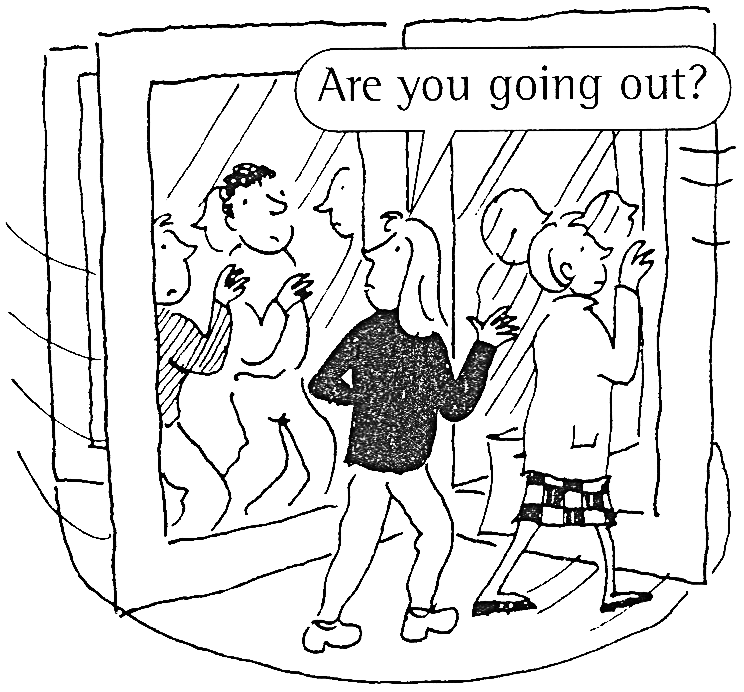
Example: A: Are you going out?
B: No, we’re coming in!
|
B: No, I’m not. I’m laughing! B: No, he isn’t. He’s leaving. B: No, they aren’t. They’re winning! B: No, she isn’t. She’s talking. B: No, they aren’t. They’re walking. B: No, they’re just talking loudly. B: No, I’m not. I’m writing a poem. B: No, he isn’t. He’s making ice cream. |
Write the questions and answers.
Example: (she / use / the computer ) Is she using the computer? No, she isn’t. She is reading a book.
|
|
( they / make / a cake )
|
|
( Nick / use / the phone)
|
|
( he /work / in his room ) |
|
( you two / tidy up / the room )
|
|
Complete the questions with what, where, why and the present continuous.
Example: your mother / do / ? What’s your mother doing?
She is cooking.
Judy / wear / ?
a new red dress.
the children / play / ?
in the garden.
the baby / cry / ?
because she is hungry.
Jim / work / at the moment / ?
at a bank in the city center.
Jack and Jill / stay at home / ?
because it’s raining.
they / shop/?
at the new supermarket.
the students / do / ?
a scientific experiment.
you / eat / your sandwiches so early / ?
because I’m hungry.
Tom / stay / ?
at a hotel.
we / wait / for the Number 14 bus / ?
because Number 9 isn’t running today.
you / go / ?
to the corner shop.
she /take / to the party / ?
her CD-player.
Complete the conversation.
Jordan: Hi, Neil, it’s me – Jordan.
Neil: Oh, hi, Jordan. (Where /you / from?)
Where are you phoning from?
Jordan: (I / phone) …………(1) from Aunt Tracy’s mobile. (Jamie and I / stay) ………… (2) with her for a few days.
Neil: Oh, right.
Jordan: So, (what / you / do / ?) ………… (3)
Neil: Nothing much. Why?
Jordan: Well, (you / use) ………… (5) them?
Neil: No, I’m not. In fact, (Julia and I / stay) ………… (6) at home today.
Jordan: Oh yes?
Neil: (We / not / feel) ………… (7) well.
Jordan: Oh, I’m sorry to hear that.
Neil: I think we’ve got flu.
Jordan: Oh, dear. (you / take) ………… (8) any medicine?
Neil: No, we aren’t. (We / keep) ………… (9) warm and (we / drink) ………… (10) plenty of water.
Jordan: Anyway, can I borrow your rollerblades?
Neil: Sure.
Jordan: OK. (I / walk) ………… (11) to the bus stop right now. Great! (The bus / come) ………… (12).
Neil: Come and have some tea.
Jordan: Er, no thanks. Just leave the rollerblades outside the door.
Neil: Oh, OK.
Jordan: (I / get) ………… (13) on the bus. Bye!

